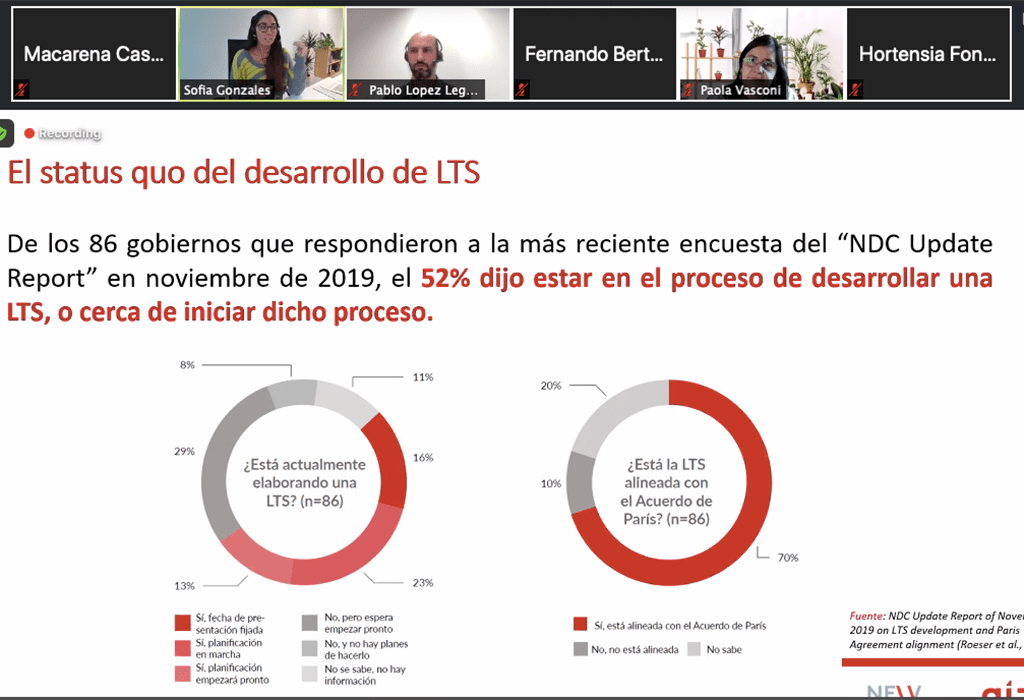The session, which was attended by representatives from 11 countries in the region, addressed the main elements to be considered by decision-makers for the development of LTS.
Santiago de Chile, December 14, 2020. Meeting the objectives of the Paris Agreement requires short-, medium-, and long-term plans to establish actions and strategies for reducing greenhouse gas emissions and keeping the increase in global temperature below 1.5ºC. In fact, the Agreement, in its Article 4.19, invites all Parties to the United Nations Framework Convention on Climate Change to formulate and communicate long-term low greenhouse gas (GHG) emission development strategies. In doing so, Parties should take into account Article 2, i.e. taking into account their common but differentiated responsibilities and respective capabilities, according to different national circumstances. Thus, the Long-Term Climate Strategies (LTS) are fundamental instruments for managing climate change and defining national guidelines for 2050 in the areas of mitigation and adaptation.
In this context, the EUROCLIMA+ Programme, under the framework of its initiative “Regional Collaboration for transparency and compliance with NDCs and generation of Long-Term Climate Strategies”, through the German Society for International Cooperation (GIZ), and in collaboration with the NewClimate Institute developed the virtual training workshop "Making Low-GHG Emission Development Strategies a Reality", in which options for the preparation of long-term low GHG emissions development strategies were presented and discussed. The contents of the guide “Making long-term low GHG emissions development strategies a reality”, developed by the NewClimate Institute with support from GIZ, was published in May of this year. It is worth mentioning that this guide was developed under the framework of the project "Capacity Building for Climate Policy in Southeastern countries, Eastern Europe, the Southern Caucasus and Central Asia, Phase III" which is part of the International Climate Initiative (IKI) supported by the German Federal Ministry for the Environment, Nature Conservation and Nuclear Safety.
The guide “Making low-GHG emission development strategies a reality” contains a number of key messages and different perspectives that should be taken into account by decision-makers in the preparation of LTS and it has considered the context of several countries. This guide is of great importance for Latin America if we consider that Mexico, Costa Rica, and very recently Guatemala are the only 3 countries that have presented their Long-Term Climate Strategies, and that at the same time several countries in the region are working to have their strategies in the coming years: 2021 here Chile, Colombia stand out, and the following ones, Argentina, Uruguay, Peru, Panama, Honduras, among others. In this regard and thanks to support from the EUROCLIMA+ programme, this publication was translated into Spanish (previously it was only available in English) to facilitate its communication to the participants and the Spanish-speaking community in general.
In addition, and in order to contribute to capacity building and experience exchanges that would reduce the gaps in the development of national LTS processes in Latin America, EUROCLIMA+ and the NewClimate Institute developed virtual training, which addressed the three main concepts defined in this guide: Constant revision of the LTSs beyond 2020 (in line with NDC revisions); Integration of current conditions and specific circumstances for each country (different levels of detail depending on the information available); Eight key aspects to consider in an LTS.
Although this collaboration only meant to carry out training with the countries participating in the platform - Argentina, Chile, Colombia, Costa Rica and Uruguay - the relevance of the topic and in order to expand the dissemination of these tools, the invitation was extended to all partner countries of the programme, with the participation of 24 representatives from 11 countries in the region.
The event began with an introduction by Paola Vasconi, Regional Advisor on Climate Governance, GIZ/EUROCLIMA+, who presented the central elements of the programme and the context in which the guide in question and the training were developed.
Sofia Gonzales-Zuñiga and Pablo López Legarreta from NewClimate Institute were in charge of conducting the exchange and the activities, reviewing in detail the different elements and processes that are addressed in the above-mentioned guide. Thus, through the presentations and the participation of the attendees, the processes, opportunities, and experiences regarding LTS preparation were discussed.
The countries participating in the action then presented their own experiences, emphasising successful practices, identified opportunities, and relevant lessons for further progress in climate action and national strategies.
Together with the above, through interactive questions put to the participants, it was possible to learn about the state of progress of the processes in the different countries of the region, and the main challenges that still need to be addressed.
Check and download the guide below:
“Making low-GHG emission development strategies a reality”
About EUROCLIMA+
EUROCLIMA+ is a programme financed by the European Union to promote environmentally sustainable and climate-resilient development in 18 Latin American countries, particularly for the benefit of the most vulnerable populations. The Programme is implemented under the synergistic work of seven agencies: the Spanish Agency for International Development Cooperation (AECID), the French Development Agency (AFD), the Economic Commission for Latin America and the Caribbean (ECLAC), the German Society for International Cooperation (GIZ), Expertise France (EF), the International and Ibero-American Foundation for Public Administration and Policy (FIIAPP), and UN Environment.

